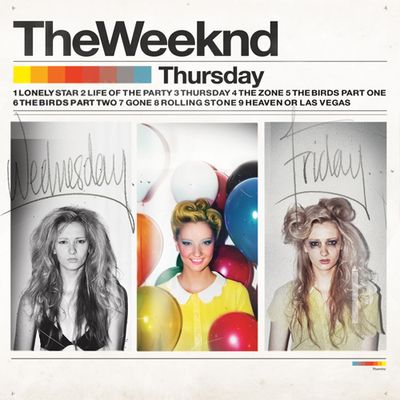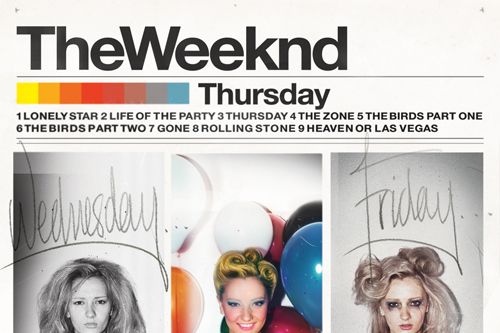

Thursday is the new album from the shadowy Canadian R&B project the Weeknd the second of three records released for free via their website; the third is still to come and one thing you can say in its favor is that it’s almost surely the best-sounding album you’ll be offered for free this year. Unlike the sample-based songs on the Weeknd’s debut, House of Balloons, the productions here revolve around singer Abel Tesfaye’s original compositions, and they’re full of immersive touches: echoes that ricochet this way and that, woozy shards of keys and organ, slow rumbles, slow and creaky runs of acoustic guitar, and every other imaginable signifier of heavy-lidded sensuality. There are even a few leans into dub reggae, during which, amazingly, the album actually sounds more alert, less torpid. The budget behind this record and the amount of care that’s been put into making it must both be high; its sense of physicality and the alluring bleakness of its mood are top-notch.
But here’s the odd part: Apparently, some people find this music to be chilled out, relaxing, and sensual, as if it’s the audio equivalent of a warm bath. That metaphor would be more apt if said bath were, say, filled with blood from a recent suicide attempt. The heart of Thursday, even more than House of Balloons, is absurdly uneasy and filled with flashes of what should be terror. Just consider the narrative going on in the lyrics, which revolves around a young hot-shot Lothario and a woman he’ll only care about on Thursdays. For a sense of how that works, just check out the album’s cover and its three photos: The one labeled “Wednesday” shows a woman, shot in black-and-white, looking glamorous. “Thursday” has her in full color and makeup, surrounded by balloons. And “Friday” is back to black-and-white, her cheeks streaked with tears and mascara, her eyes looking either wounded or just dead.
Women come in for a lot of that on this album; they’re always begging, pleading, desperate, powerless, manipulated, plied with drugs. A two-song suite in the center of the record revolves around the line “don’t make me make you fall in love with a nigga like me,” which is actually pretty dense and complicated — not just cocksure of the speaker’s ability to make someone fall in love with him, but manipulative enough to tell you it’s your fault for forcing him to. Throw in a liberal helpings of drugs, which for the Weeknd are scattered everywhere until they deform the actual shape of the world — everyone stumbling desperately through parties and sex and tears, faded into nothing, plumbing some edge of human behavior, until Tesfaye actually catalogues his emotions by referring to how much serotonin is left in his system — and the description we’re looking for runs screaming away from “chilled out” and lands somewhere a lot closer to “sordid.”
Another way of putting this is to say that Tesfaye is fast becoming the David Lynch of R&B. He’s obsessed — just like Blue Velvet and Twin Peaks and Lost Highway were — with the idea of those luxuriously appointed back rooms where we all imagine something desperate and skeezy is going on. Like Lynch, he paints those spaces in eerie, narcotic colors; his mood is heavy-lidded and hazy, full of worn-out broken people on the verge of collapse. (“Weeknd,” it turns out, is meant to be pronounced “weakened.”) And, like Lynch, he always approaches these spaces through the same old archetypal story: the innocent woman lured by the devilish man into some abject whirl of sex and pills and sordidness, and left broken at the end. The main difference is that Lynch casts someone to portray that man and play him as a blood-curdling force of evil — Dennis Hopper huffing at a gas mask in Blue Velvet, malevolent long-haired spirits and Canadian brothel runners in Twin Peaks, a raged-out Robert Loggia in Lost Highway. Tesfaye plays that guy himself. And he edges the character so far away from villainy — inhabits it so securely, as if this brutal Lothario thing really is his trip — that you begin to wonder how much of it is an aesthetic and how much you’re just listening to a young man be creepy.
Not that he seems to enjoy it. The entire mood of the Weeknd’s music seems built to insist, over and over, that there’s something joyless and hollow about this milieu. If rappers like Kanye West and Drake (a hometown Weeknd supporter who appears on Thursday) like to brag about luxury and then tell you how burdensome it is, well, Tesfaye likes to do the same with drugs, sex, seduction, and the freedom that presumably comes from approaching them all like a morally indifferent glutton. In almost any kind of narrative besides pop music, that approach would actually seem conservative. After all, our Lynches and Tesfayes are far from the only people obsessed with the tale of the woman brought low in the back room — it’s just as much the crux of soap operas, Lifetime movies, cautionary anti-drug tales, and nearly every film ever described as a “psycho-sexual thriller.” Audiences have a very defined and predictable relationship with that sort of thing: They’re titillated because they want to peek into those back rooms, and they want them to be sordid and dangerous and perverse. That’s part of the glamour (see, for instance: heroin chic. Eyes Wide Shut. David Cronenberg). But it’s possible they also want some line drawn that explains to them where they stand: an assurance that there’s something intriguingly kinky and risky happening on the other side of that locked door. Something they’re worldly and sophisticated enough to understand, but better off choosing to stay on the safe side of.
There are many simple explanations for the Weeknd’s crossover appeal among people who normally shy away from R&B — a trick that’s pretty widespread, lately. The project’s keen sense of mood and sonics, and its etiolated bleakness, both fit in perfectly with the art-rock world, even before you get to indie-rock samples and references. (House of Balloons borrowed sounds from Beach House and Siouxsie Sioux; Thursday titles one track “Heaven or Las Vegas,” after a song by the Cocteau Twins.) Tesfaye occasionally comes across like an oily, extroverted, smooth-voiced counterpart to the British producer Tricky. (The one notable sample on Thursday comes from an album by Martina Topley-Bird, who sang on Tricky’s best-known records.) And putting a dark, arty spin on R&B will inevitably appeal to people who normally dismiss the genre as cheesy and superficial. But there are also some for whom R&B feels alien in a different way — too sweat-slick and lascivious, sexually frank, shot through with a view of gender and sexuality that can feel vulgar or cruel. It’s easy to wonder if, for a few fans, the Weeknd performs the service of doubling down and confirming that worldview — making R&B that’s supposed to be alien, taboo, and morally corroded, leaving you feeling like you’re touring R. Kelly’s old basement. It even does so in the form of an overblown dark-side soap opera, which is about the same way one would describe 40 percent of Lynch’s lifetime output.
Tesfaye’s aesthetic is so well-honed, so complete, that you’d suspect he’s creating that narrative on purpose. There’s at least one bit of Thursday on which it seems like he’s switching characters, play-acting the roles of everyone involved. If the Weeknd’s milieu is an invention, it’s a complicated one: potent and off-putting at the same time, and a lot more cynical and brutal than anyone should be enjoying in a straightforward way. It’s a lot of darkness for a guy whose patronym translates, roughly, as “my hope.”
Related: Slow Jams For the Otherwise Arty [NYM]
PBR&B Ten-Pack [NYM]




